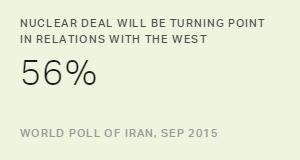Story Highlights
- China approval higher than U.S. approval in both Egypt, Iran
- U.S. leadership approval nearly twice as high in Iran as in Egypt
- More ambiguity surrounds perceptions of Chinese leadership than U.S.
WASHINGTON, D.C. -- As Chinese President Xi Jinping visits Egypt and Iran on his Middle East tour this week, based on approval ratings, China is on stronger footing with the publics in these countries than are other major world powers. Ratings of China's leadership in these two countries are statistically tied, with slightly less than one-third of both Egyptians (31%) and Iranians (30%) approving. Still, these ratings are higher than the ones for the U.S., the European Union and Russia.

Xi is expected to use the trip to assert China's role in the region and on Friday will be the first major world leader to visit Iran since the U.S. and the EU lifted sanctions last weekend. This may be a chance for him to further build China's brand. Although their approval ratings are higher, considerable numbers of Egyptians (33%) and Iranians (39%) don't know enough about the leadership of China to answer the question. And about as many Egyptians (36%) and Iranians (32%) affirm that they disapprove of China's leadership.
U.S. Approval Dismal Among Egyptians, Stronger in Iran
Despite decades of close cooperation, significant military aid and choosing Cairo as President Barack Obama's platform from which to speak to the Muslim world, a majority of Egyptians (62%) continue to disapprove of U.S. leadership. And the 10% of Egyptians who approve of U.S. leadership is one of its worst ratings in years. In fact, Egyptians are now less likely than Iranians (19%) to say they approve of U.S. leadership.

While a majority of Iranians (51%) also disapprove of the U.S., ratings have improved considerably since 2011, and disapproval is at its lowest point in years. U.S. approval among Iranians saw an increase of five percentage points after Iran reached a nuclear deal with world powers, and it is at its highest point in years. As with China's leadership, roughly three in 10 Iranians (30%) and Egyptians (28%) don't offer an opinion about U.S. leadership.
Russia's Second Wind in the Region
Since the Soviet era, when it had stronger ties with a number of countries in the Middle East, Russia's presence in the region has been relatively obscure -- until recently. Russia's resurgence is apparent not only in the Syrian civil war theater and in Moscow's support of Iran, but also in strengthening economic and military ties with Arab nations such as Egypt and Saudi Arabia.

Approval ratings of Russia's leadership in both Egypt and Iran have increased since 2011. After approval ratings in Egypt dropped to an all-time low of 11% in 2012, a revived Cairo-Moscow relationship is apparent in the 27% of Egyptians who now approve of Russia's leadership. While 24% of Iranians share that view, it is important to consider that Russia has been a steadfast ally of Iran, particularly in the latter's policies in the Syrian war. It is also important to note that the Egyptian survey predates the Sharm el-Sheikh terrorist attack that downed a Russian Airbus flight.
Still, many in Egypt (34%) and Iran (39%) don't have an opinion about Russia's leadership. And it's important to point out that residents in each country are more likely to disapprove than approve of the country's leadership. Nearly four in 10 Egyptians (39%) and Iranians (37%) affirm their disapproval of Russian leadership.
EU Leadership Approval on the Rise in Iran
The EU has played a key role in the nuclear deal negotiations that paved the way for the removal of sanctions related to the country's nuclear program. Most Iranians saw these sanctions that the U.S., the United Nations and Western Europe imposed as . Since 2011, and as various stages in the nuclear negotiations have unfolded, EU leadership approval has increased steadily among Iranians. Although the agreement was reached in July, in September 2015, Iranians were about as likely to approve of EU leadership (26%) as they were the year before (24%) -- but both ratings are still about twice as high as they were in 2011 and 2012.

Egyptians (19%) were slightly less likely than Iranians to approve of EU leadership in 2015. While 34% of Iranians disapproved of EU leadership in 2015, a plurality of Egyptians (46%) shared that view. However, a considerable amount of ambiguity about EU leadership remains, as many Iranians (39%) as well as Egyptians (35%) don't offer an opinion.
Bottom Line
Xi has set out to increase China's geopolitical footprint throughout the world in 2016. As the country currently holds the leadership seat for the G-20, and sees a shifting landscape in the Middle East and North Africa (MENA) region, various economic opportunities will likely present themselves in the coming years. Despite its decades-long track record of heavy diplomatic and military involvement in the region, the U.S. fares worse than both China and Russia on leadership approval.
However, while strong government-to-government relations do not necessarily manifest positive approval ratings among citizens, some countries such as Russia have perhaps seen their approval ratings improve from strengthening leader-to-leader relations. It is interesting to note that Egyptian perceptions of Russia may be driven more by Moscow's direct relationship with Cairo than by Russia's involvement and alignment with Syria and Iran throughout the broader region.
The current rising tensions between Saudi Arabia and Iran present Xi with a unique opportunity to begin wading his feet into the warm waters of Middle East power jostling. Similarly to Pakistan, China finds itself as one of few global actors with strong economic and geopolitical interests in strengthening its relations with both Iran and Saudi Arabia. As China's president tours the region to announce major trade cooperation and infrastructure project initiatives, it is no coincidence that he will arrive in Tehran just days after Implementation Day, when the International Atomic Energy Agency certified that Iran is in compliance with the required restrictions on its nuclear capabilities. This year will likely prove to be one of a balancing act of interests for China in the MENA region, one that requires improved relations with Riyadh, Cairo and Tehran.
These data are available in .
Survey Methods
Results in Egypt are based on face-to-face interviews with 1,000 adults, aged 15 and older, conducted Aug. 7-15, 2015. For results based on the total sample of national adults, the margin of sampling error is ±3.6 percentage points at the 95% confidence level.
Results in Iran are based on telephone interviews with 1,001 adults, aged 15 and older, conducted Sept. 4-22, 2015. For results based on the total sample of national adults, the margin of sampling error is ±3.9 percentage points at the 95% confidence level.
For more complete methodology and specific survey dates, please review .
Learn more about how the works.


